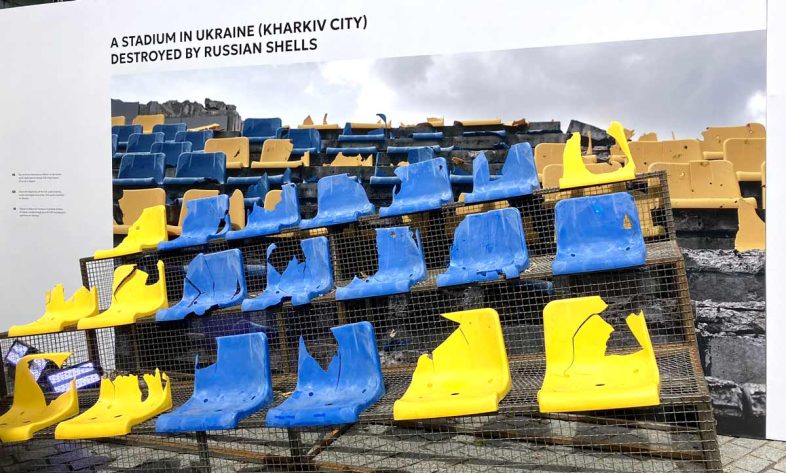Despite Ukraine’s modest achievements at the XXXIII Olympic Games – with fencer Olha Kharlan securing a bronze medal and shooter Serhiy Kulish winning a silver medal in the 50m rifle three positions event– the atmosphere in the Ukrainian Olympic House Volia Space is nearly festive. Nearly, because the shadow of war looms large, emphasised by an installation of chairs from the Kharkiv stadium, destroyed by Russian attacks. “The fact that we are here is, in a sense, already an achievement,” says Vadym Guttsait, president of the National Olympic Committee of Ukraine. This approach, both combative and realistic, permeates all levels of Ukrainian sports communication.
In the face of railway sabotage and other attempts to disrupt the Olympic Games, the French have succeeded in creating a truly festive atmosphere. Paris is not just cheering for the world’s top athletes; it’s revelling in the event. “Celebrations are necessary!” says one of the volunteers from the Serbian House, located right next to the Ukrainian one. “Come to us and see for yourself: a small country does not mean small ambitions!”
The Ukrainian House Volia Space marks Ukraine’s debut in combining communication with Olympic participation. Nestled in Paris’s La Villette park amidst an array of national pavilions, it proudly carries the motto “The Will to Win,” a rallying cry for both the national team and the Olympic House. The venue’s organisers have crafted numerous compelling and creative displays to illustrate and amplify this indomitable spirit.
Sitting beside me, a French teenager watching a short film about Sasha Pascal struggled to hold back tears. “My name is Sasha; I am 8 years old,” Sasha’s youthful voice resounded clear and confident. “My dream is to become an Olympic champion.” Despite losing her leg during the shelling of Odesa, Sasha has not given up on her athletic aspirations. Equipped with a prosthetic, she continues to train in her hometown, fueled by an unwavering belief in victory.

Photo: Alla Lazareva
Equally impressive is another video, reconstructed with the help of artificial intelligence. The project, called The Revived, “revives” the faces of deceased athletes, thereby posthumously fulfilling their dream of being present at the Olympic Games. Boxer Maksym Galinichev, the vice-champion of the 2018 Youth Olympics, appears almost lifelike. He died on 10 March 2023, in the battles in the Luhansk region. Maksym had the opportunity to participate in the European Boxing Championship in May 2022 but chose instead to join the armed defence of Ukraine. Despite being wounded twice, he returned to the airborne assault troops each time he was discharged from the hospital.
A light panel in the Ukrainian Olympic House poignantly reminds visitors, “During the war, the Russians destroyed over 500 sports facilities and killed nearly 500 athletes and coaches, including 20 world champions, European champions, and Olympic participants.” Numerous artistic installations and event guests commemorate the destroyed lives, stadiums, dreams, and homes. Ukraine fights not only for sports medals but also for the right to life and international support. Every voice, every word in defence of Ukraine’s struggle is also our small victory—a communicative one.
Charlie began supporting Ukraine in 2022. “I try not to miss any demonstrations when work permits,” he told The Ukrainian Week. “I’ve had Ukrainian friends since high school, and they were the ones who first invited me to Ukrainian rallies. Later, I met the family of the late Ukrainian athlete Fedir Yepifanov—his mother and brothers. At one rally, I carried a banner with the image of this very young man. I must say, it’s a profoundly moving experience: realising how brief his life was and how early he was taken from us. Fedir’s mother will soon come to Paris, and we will finally meet in person. Here I am with you, wishing you victories—both in sports and, most importantly, on the battlefield.”
The number of medals is not the ultimate measure of Olympic participation. The emotions that swept through the hall when Kharlan won her bronze medal are beyond words. The audience wasn’t just 90% but fully 100% behind Olha. Support cannot always be quantified. Who knows what the sincere admirers of the Ukrainian athlete might do to support Ukraine? French teenagers, fans of Kharlan, recently asked me how to weave and send camouflage nets to Ukraine. The battle for human hearts is a subtle and profound one.

Photo: Alla Lazareva

